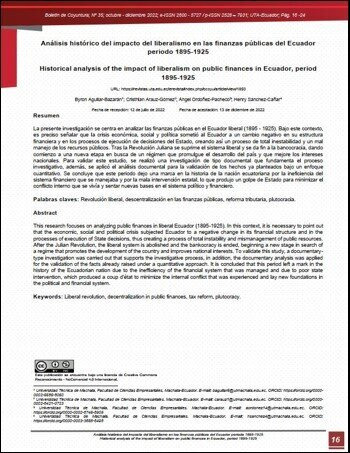Historical analysis of the impact of liberalism on public finances in Ecuador, period 1895-1925
Main Article Content
Abstract
This research focuses on analyzing public finances in liberal Ecuador (1895-1925). In this context, it is necessary to point out that the economic, social and political crisis subjected Ecuador to a negative change in its financial structure and in the processes of execution of State decisions, thus creating a process of total instability and mismanagement of resources. public resources. After the Julian Revolution, the liberal system is abolished and the bankocracy is ended, beginning a new stage in search of a regime that promotes the development of the country and improves national interests. To validate this study, a documentary-type investigation was carried out that supports the investigative process, in addition, the documentary analysis was applied for the validation of the facts already raised under a quantitative approach. It is concluded that this period left a mark in the history of the Ecuadorian nation due to the inefficiency of the financial system that was managed and due to poor state intervention, which produced a coup d'état to minimize the internal conflict that was experienced and lay new foundations. in the political and financial system.
URL: https://revistas.uta.edu.ec/erevista/index.php/bcoyu/article/view/1850
Downloads
Article Details

This work is licensed under a Creative Commons Attribution-NonCommercial 4.0 International License.
![]()
The publications of the Boletín de Coyuntura are licensed under a Creative Commons Attribution-NonCommercial 4.0 International License (CC BY-NC 4.0). The Universidad Técnica de Ambato retains the copyright of the published works, and favors and allows the reuse of these, as long as: the authorship and original source of publication is cited, and they are not used for commercial or onerous purposes. The intellectual property of the published articles belongs to the authors.
References
Abad, A., Acuña, C., & Naranjo, E. (2020). El cacao en la Costa ecuatoriana: estudio de su dimensión cultural y económica. Estudios de La Gestión. Revista Internacional de Administración, 7(7), 59–83. https://doi.org/https://doi.org/10.32719/25506641.2020.7.3
Acosta, A. (2014). Breve historia económica del Ecuador. Corporación Editora Nacional - UASB-E. https://elibro-net.basesdedatos.utmachala.edu.ec/es/lc/utmachala/titulos/115744
Ayala Mora, E. (2000). Dimensión regional de la Revolución Liberal ecuatoriana. Revista de Historia, Patrimonio, Arqueología y Antropología Americana, 2, 57–64. http://www.rehpa.net/ojs/index.php/rehpa/article/view/22/37
Bernal, C. (2016). Metodología de la investigación (PEARSON (ed.); 4th ed.). McGraw-Hill. https://books.google.com.ec/books?id=76QzvwEACAAJ
Castillo, T. (2016). Las finanzas públicas de Ecuador en el siglo XX [Universidad de la República]. https://www.colibri.udelar.edu.uy/jspui/bitstream/20.500.12008/8884/1/TUM_CastilloAtenea.pdf
Díaz Narváez, V., y Calzadilla Núñez, A. (2016). Artículos científicos, tipos de investigación y productividad científica en las Ciencias de la Salud. Rev. Cien. Salud, 14(1), 115–121. https://doi.org/dx.doi.org/10.12804/revsalud14.01.2016.10
Dulzaides, M. E., y Molina, A. M. (2004). Análisis documental y de información: dos componentes de un mismo proceso. Acimed, 12(2), 1–5. https://www.scopus.com/inward/record.uri?eid=2-s2.0-
El Telégrafo. (2011). Revolución Juliana. El Telégrafo. https://www.eltelegrafo.com.ec/noticias/columnistas/15/revolucion-juliana
Esvertit Cobes, N. (2005). INCORPORACIÓN DEL ORIENTE ECUATORIANO AL ESTADO NACIONAL (1830-1895). LA INCIPIENTE PROVINCIA. https://www.tdx.cat/bitstream/handle/10803/704/00.PREVIO.pdf?sequence=1&isAllowed=y
González Leal, M. Á. (1997). Insurgencia popular, oligarquía regional y estado en el Ecuador liberal (1895-1925): la Huelga General de Guayaquil, 1922. Anuario De Estudios Americanos, 54(1), 1159–1184. https://estudiosamericanos.revistas.csic.es/index.php/estudiosamericanos/article/view/403/409
Herbas Torrico, B. C., y Rocha Gonzales, E. A. (2018). Metodología científica para la realización de investigaciones de mercado e investigaciones sociales cuantitativas. Perspectivas, 21(42), 123–160. http://www.scielo.org.bo/pdf/rp/n42/n42_a06.pdf
Maiguashca, J. (2014). La incorporación del cacao ecuatoriano al mercado mundial entre 1840 y 1925, según los informes consulares. Procesos. Revista Ecuatoriana de Historia, 1(35 SE-Estudios), 67–98. https://doi.org/10.29078/rp.v1i35.49
Martínez Ruiz, H. (2012). Metodología de la investigación. Cengage Learning. https://elibro-net.basesdedatos.utmachala.edu.ec/es/ereader/utmachala/39957?page=102
Monroy Mejía, M. D. L. Á. y Nava Sanchezllanes, N. (2018). Metodología de la investigación. Grupo Editorial Éxodo. https://elibro-net.basesdedatos.utmachala.edu.ec/es/ereader/utmachala/172512?page=71
Pareja Cucalón, F. (1992). La Evolución Socio-Económica del Ecuador: Modernización sin Desarrollo. https://repositorio.cepal.org/bitstream/handle/11362/28238/S9200170_es.pdf
Paz y Miño Cepeda, J. (2001). La fundación del Banco Central del Ecuador y su significado histórico a los 75 años. Banco Central Del Ecuador. https://contenido.bce.fin.ec/documentos/PublicacionesNotas/Catalogo/Memoria/2001/cap05.PDF
Paz y Miño Cepeda, J. (2002). Revolución Juliana (3rd ed.). Ediciones ABYA-YALA. https://digitalrepository.unm.edu/cgi/viewcontent.cgi?article=1143&context=abya_yala
Paz y Miño Cepeda, J. (2014). LA REVOLUCIÓN JULIANA (1925): SIGNIFICACIÓN HISTÓRICA PARA EL PRESENTE. Historia y Economía. http://revistas.uned.es/index.php/ETFV/article/view/14501/12965
Paz y Miño Cepeda, J. (2015). Historia de los Impuestos en Ecuador (Primera). http://the.pazymino.com/JPyM-HISTORIA_DE_LOS_IMPUESTOS_EN_ECUADOR-Quito-JunJul2015.pdf
Paz y Miño Cepeda, J. (2016). DRAMA Y MITO: LOS IMPUESTOS EN LA HISTORIA DEL ECUADOR. Historia y Economía, 1–26. http://www.historiaypresente.com/hyp/wp-content/uploads/2016/11/drama-mito-impuestos.pdf
Paz y Miño Cepeda, J. (2018). Eloy Alfaro: Políticas Económicas (1895-1911) (Primera). UTE. https://www.ute.edu.ec/eloy-alfaro-politicas-economicas-1895-1911-el-nuevo-libro-de-juan-paz-y-mino/
Paz y Miño Cepeda, J. (2022a). Bancos del Ecuador: historia por contar. Historia y Presente. https://www.historiaypresente.com/bancos-del-ecuador-historia-por-contar/
Paz y Miño Cepeda, J. (2022b). Bancos: la historia por contar. Pichincha Comunicaciones. https://www.pichinchacomunicaciones.com.ec/bancos-la-historia-por-contar/
Peña, T., & Pirella, J. (2007). La complejidad del análisis documental. Información, Cultura y Sociedad, 16, 55–81. https://www.redalyc.org/pdf/2630/263019682004.pdf
Prieto, M. (2004). Liberalismo y temor: imaginando los sujetos indígenas en el Ecuador (1era ed.). ABYA YALA.
Ramón Valarezo, G., y Torres Dávila, V. H. (2004). El desarrollo local en el Ecuador: historia, actores y métodos (1ra ed.). ABYA YALA.
Rodríguez, L. A. (1985). Política y poder en el Ecuador, 1830-1925. Quinto Cenetenario, 7(1), 17–53. https://revistas.ucm.es/index.php/QUCE/article/download/QUCE8484110017A/1836
Rodriguez, L. A. (1992). Las finanzas publicas en el Ecuador liberal: 1895-1925. SECUENCIA, 23, 125–172. https://doi.org/http://dx.doi.org/10.18234/secuencia.v0i23.386
Simon Campaña, F. (2015). La reacción jurídica del Ecuador ante la Primera Guerra Mundial: de la neutralidad a la ruptura de relaciones. Iuris Dictio, 14(16). https://doi.org/10.18272/iu.v14i16.735
Sinardet, E. (1998). La pedagogía al servicio de un proyecto político: El Herbartismo y el liberalismo en el Ecuador (1895-1925). Procesos. Revista Ecuatoriana De Historia, 1(13), 25–41. https://revistas.uasb.edu.ec/index.php/procesos/article/view/2111/1898


